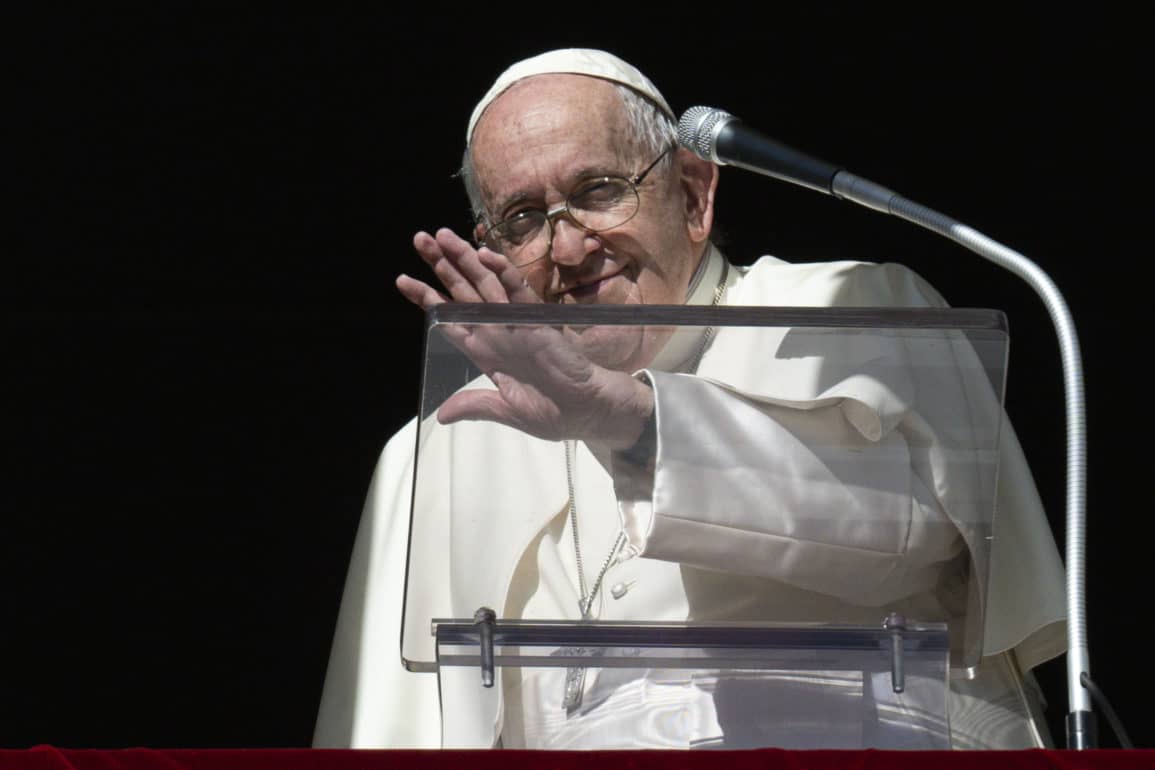At 12 noon today, the Holy Father Francis looked out of the studio window in the Vatican Apostolic Palace to recite the Angelus with the faithful and pilgrims gathered in St Peter’s Square.
These were the Pope’s words in introducing the Marian prayer:
Before the Angelus
Dear brothers and sisters, buongiorno!
Today, in the Liturgy, the Gospel narrates the encounter between Jesus and Zacchaeus, chief of the publicans of the city of Jericho (Lk 19: 1-10). At the centre of this account there is the verb to seek. Pay attention: to seek. Zacchaeus “was seeking to see who Jesus was” (v. 3), and Jesus, after meeting him, states: “the Son of Man has come to seek and to save what was lost” (v. 10). Let us focus a little on these two gazes that seek: the gaze of Zacchaeus who is seeking Jesus, and the gaze of Jesus who is looking for Zacchaeus.
The gaze of Zacchaeus. He is a publican, that is, one of those Jews who collected taxes on behalf of the Roman rulers, a traitor of the homeland, and took advantage of their position. Therefore, Zacchaeus was rich, hated – hated! – by all and branded a sinner. The text says “he was short in stature” (v. 3), and this perhaps also alludes to his inner baseness, to his mediocre, dishonest life, with his gaze always turned downwards. But the important thing is that he was little. And yet, Zacchaeus wants to see Jesus. Something drove him to see him. “He ran ahead”, says the Gospel, “and climbed a sycamore tree in order to see Jesus, who was about to pass that way” (v. 4). He climbed a sycamore: Zacchaeus, the man who dominated everyone, made himself ridiculous and took the path of ridicule – to see Jesus. Let us think a little of what would happen if, for instance, a minister of the economy climbed a tree to look at something: he would risk mockery. And Zacchaeus risked mockery to see Jesus, he made himself look ridiculous. Zacchaeus, despite his lowliness, feels the need to seek another way of looking, that of Christ. He does not yet know him, but he awaits someone who will free him from his condition – morally low – to bring him out of the mire in which he finds himself. This is fundamental: Zacchaeus teaches us that, in life, all is never lost. Please, all is never lost, never. We can always find space for the desire to begin again, to start over, to convert. Re-convert, re-begin, re-start. And this is what Zacchaeus does.
In this regard, the second aspect is decisive: the gaze of Jesus. He was sent by the Father to seek those who are lost; and when he arrives in Jericho, he passes right by the tree where Zacchaeus is. The Gospel narrates that “Jesus looked up and said to him, “‘Zacchaeus, come down quickly, for today I must stay at your house’” (v. 5). It is a truly beautiful image, because if Jesus has to look up, it means that he is looking at Zacchaeus from below. This is the history of salvation: God has never looked down on us – no; to humiliate us – no; – to judge us – no; on the contrary, he lowered himself to the point of washing our feet, looking at us from below and restoring our dignity to us. In this way, the meeting of eyes between Zacchaeus and Jesus seems to encapsulate the whole of salvation history: humanity, with its miseries, seeks redemption, but firstly, God, with mercy, seeks the creature to save it.
Brothers, sisters, let us remember this: the gaze of God never stops at our past, full of errors, but looks with infinite confidence at what we can become. And if at times we feel we are people who are “short in stature”, not up to the challenges of life and far less of the Gospel, mired in problems and sins, Jesus always looks at us with love, he looks at us: as with Zacchaeus, he comes towards us, he calls us by name and, if we welcome him, he comes to our home. Then we might ask ourselves: how do we look at ourselves? Do we feel inadequate, and resign ourselves, or precisely there, when we feel down, do we seek the encounter with Jesus? And then: what gaze do we have towards those who have erred, and who struggle to get up again from the dust of their mistakes? Is it a gaze from above, that judges, disdains, excludes? Remember that it is legitimate to look down on someone only to help them get up again: nothing more. Only then is it legitimate to look down from above. But we Christians must have the gaze of Christ, who embraces from below, who seeks those who are lost, with compassion. This is, and must be, the gaze of the Church, always, the gaze of Christ, not the condemning gaze.
Let us pray to Mary, whose humility the Lord looked upon, and ask her for the gift of a new outlook on ourselves and on others.










